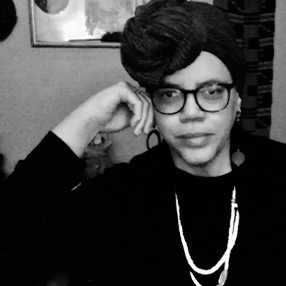Abraham Lincoln Turns to Listen to the Lower Ninth
Unsteady aquanauts,
we leave behind the capsules of our mothers’ bodies.
This is who we are,
moving along the tributaries that take us away
and back home
to the delta and the sea.
Pushing along Okwata—wide wide water
we live
Bayougoula Mougoulacha
Chitmacha Oumas
Tangipaho Colapissa,
Quinipissa Accapissa
among the pines and cypress,
before Pontchartrain
manacles and the deep cuts
into what we know.
Pushing through the water
inside the body of Jesus
the Lord
the Wonderer,
we huddle indecently,
resisting the foul compression
that would shame us
into that which we are not
that would turn our salty blood
into molasses
rum
cooking oil,
that would turn our bodies
into leather goods
and amusement
that would make us forget
we are water
inevitably returning to the river and the sky
always returning
baked by the sun to rising,
and falling as rain.
Pushing along the Mississippi,
Abraham Lincoln turns to see
his life and ours revolving at slow speed
shuffling into in the grand St. Louis Hotel
anywhere everywhere in New Orleans.
He watches our picked, baled and branded lives.
Hushed by the din of trading, he watches
our lips to see what we are saying.
“They were yelling, I thought I heard yelling,” he whispers
as he watches, then
“No. Of course, not.”
Pushing against the water
so many of us leave the capsules of our mothers’ bodies
parched bloated unburied.
Spinning synchronous with the circling helicopters
we turn to gain our bearings.
Our eyes fill with the funeral water
that cannot be left behind.
It is in our blood
it is our blood
it is in our tears
it is our tears
it is who we are now and then,
stumbling and blinded from all we have seen,
straining along the roadways that lead away
from the shelter of the delta and the sea.
Falling
falling
falling,
rain
falling into his blinking eyes.
Copyright © 2022 by Monifa Love. Originally published in Poem-a-Day on September 27, 2022, by the Academy of American Poets.
“In 1828, a young Lincoln was hired to take cargo to New Orleans on a flatboat. The shipment was purportedly a food product used as slave feed. On his long journey, he traveled major waterways and saw enslaved people laboring. In New Orleans, he witnessed the notorious slave market and the monstrous injustice of slavery close-up. How full his eyes must have been. Fast forward 177 years to the aftermath of Hurricane Katrina and similar sites of atrocity. The poem seeks to reflect on how American history is contorted, and to explore the relationship between Africans in America and water.”
—Monifa Love

